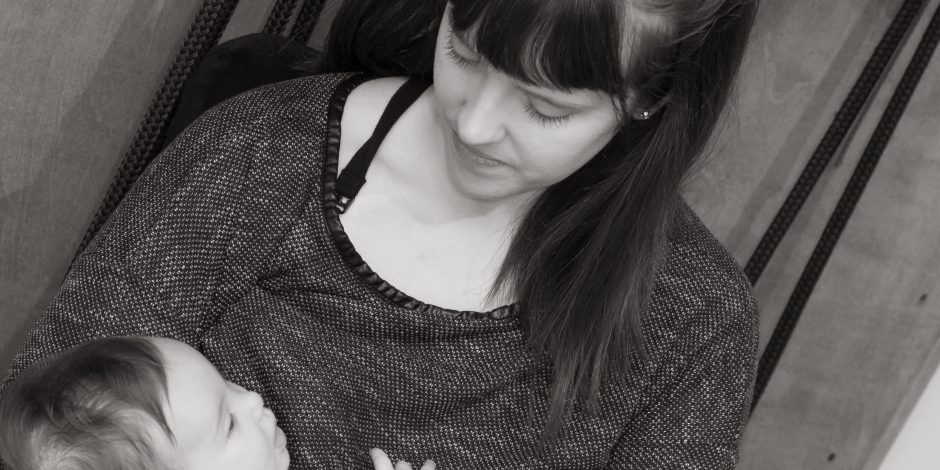
After a cesarean, many well-meaning individuals, including hospital staff and family, will tell you, “How can you be upset now? You have this beautiful baby in your arms!”
No matter how beautiful the baby in your arms, it is possible to simultaneously cherish your baby and mourn aspects of your birth. Gratitude and grief can exist side-by-side, and this will likely be the emotional tacking that defines your recovery. It is normal. Expect it. Work with it. Don’t fear the difficult or dark emotions that may come up. Cry. Talk it through. You will move through them. You will heal.
We heal through our laughter and tears. We heal by telling our stories.
From my counseling notes:
A woman I counseled had transferred from a planned homebirth and given birth by cesarean. She described a night with her six-week-old son. Her son had been crying inconsolably that evening and she herself simply reached a breaking point. She burst into tears. She described how she and her son clung to each other and cried together for what seemed like ages. She said she felt like they were both working through the challenging birth they had shared six weeks earlier. After their good cry, she described feeling much lighter and reported that her son’s crying was no longer so persistent. She felt they had really connected and shifted something through that memorable cry.
I was working with a woman who had recently given birth by cesarean. Parenting was going well. She was clearly in love with her baby. And she was openly weeping as we spoke about her birth. As we sat together on her couch, she shared an experience she had had as the surgery started. She told me that when she was lying on the table in the operating room, she had a clear image of herself at a lake in Canada with her baby in her arms. Years ago, she explained, she had visited this lake and had felt the loving presence of her late father. As her baby’s birth began, she had a flash of the lake and again felt her father’s presence. She heard the words, You and your baby are safe. She experienced a deep sense of peace as she went on to birth her baby with the help of technology. Now, in her living room a week later, she turned to me with tears running down her face and said, “This is what I had wanted from my birth. I wanted it to be spiritual and it was.”
Discover ICAN
Do you know about the online and in-person support available through the International Cesarean Awareness Network (ICAN)? ICAN is a lifeline when the going is rough! Look them up and get to a meeting!
“For me, the best thing about ICAN and what has helped me most in coming to terms with my birth is that I can talk openly about my birth. I won’t get weird or confused looks from people who think all should be well if baby’s well. Every woman there understands what I’m going through, and it reminds me that I am not crazy for caring about my birth. I really miss and crave that comfort in between meetings. I’m so glad to have found ICAN.” Ashley Crowe, ICAN Member
Help Your Baby
If the birth or the period following the birth was challenging for your baby, consider trying a few things to help your child integrate what may have been difficult.
If you and your newborn missed the first golden hour for any reason, you can create this special hour at any point hours, days or even weeks following the birth. As midwife Karen Strange says, “Repair is always possible.” Simply set aside an hour or so to focus your full attention on your child. Let this be a special time where you observe, listen to, welcome and reassure your child. Allow everything to be slow. Place your baby skin-to-skin on your chest or take a bath together for this reclaimed golden hour. If your child cries, this is fine. Just listen. If your child sleeps or nurses, lovingly pay attention and talk to your child.
If you feel there was a degree of trauma before, during or after your child’s birth, try talking to your child as she sleeps. We now know that babies—and bigger people too—listen in their sleep. This can be an effective strategy to help your child process what might have been a challenging experience. Check out the wonderful booklet by Marcy Axness on this practice (marcyaxness.com). You might also want to get to know the impressive work of Patty Wipfler, found at handinhandparenting.org.
Announce your Baby’s Birth with Pride
Your baby and birth deserve to be celebrated and announced just as any other birth would be. Celebrate your baby with photos, announcements and stories that include the heroic shifting to plan B required of this baby’s parents. In other words, don’t hide your story. Tell it with pride, even if you are still struggling with how you feel about the birth. Honor your efforts and your baby’s arrival.
Consider a Vaginal Birth After Cesarean (VBAC)
Research tells us that most women can birth vaginally following a cesarean, should they so choose. Supportive care from an obstetrician or midwife is an essential ingredient and studies show that inviting a doula to your birth team increases your likelihood of a vaginal birth significantly.
And while not everyone needs it to the same extent, coming to terms with the experience of a prior cesarean is an important step on the path to a VBAC. As part of this processing work, imagining coping well with another cesarean may be a liberating exercise. It might not feel good initially, but facing the thing we fear, and imagining coping with it, robs it of power.
For some of my VBAC clients, thinking back to their cesarean is deeply painful and contemplating the possibility of second cesarean is positively ungluing. Even so, I have made it a practice to gently invite couples to imagine – at a point in their VBAC preparation – coping well with a birth by cesarean. I’ve found that doing so helps families enter their next child’s birth as open as they possibly can.
It is my hope that anyone preparing for a VBAC will find an unexpected freedom during their birth after doing the Working with Fear exercise and listening to the Mindful Cesarean Birth Visualization in The Toolkit for a Healthy and Mindful Cesarean.
ICAN VBAC
“When I started my research about having a vaginal birth after a cesarean (VBAC), I didn’t even know what VBAC meant. I was so lucky to find ICAN and learn not only that a VBAC is possible, but that it is okay to want it and work for it. The in-person and online-based group gave me support, inspiration, information, and even cheered me on during my labor. I found a place where I could share my feelings about my first birth without shame, because they all understood. I found a place where I could share my doubts, fears, frustrations, and ask lots of questions as I traveled through my pregnancy. I can’t express how much having the ICAN support helped me in my VBAC journey. As I labored for 40 hours, these wonderful ladies were thinking of me and sending me good labor vibes – they were my virtual doulas! When I came back and shared my VBAC story, I felt their love and happiness for me. And – just the same – they poured out support for moms who had had repeat cesareans. I am forever grateful to have found ICAN and, along the way, my calling as a birth worker. I am an active member of ICAN, and happy to be able to share knowledge and support with moms who need it.” Narcisa Jovic. Co-leader, ICAN-Manhattan
What Else?
You will find additional support, perspective and information in these pages. Please read the Inspiring Birth Stories where you will find tales of women who have worked hard to understand and value their experiences of birth, including a number of repeat cesarean and VBAC tales. I’ll also suggest you explore the material in After the Birth of Your Baby that includes information on breastfeeding, skin to skin contact, and tips for navigating the physical and emotional aspects of recovering from a cesarean.
If you are having a difficult time on any front with recovery, please reach out to any of the wonderful resources I list on this website and consider contacting me for a session. Support makes a difference. Don’t go it alone. If you find yourself apathetic, overwhelmed by anger or fear, or unable to care for your baby or yourself, speak to a therapist.


